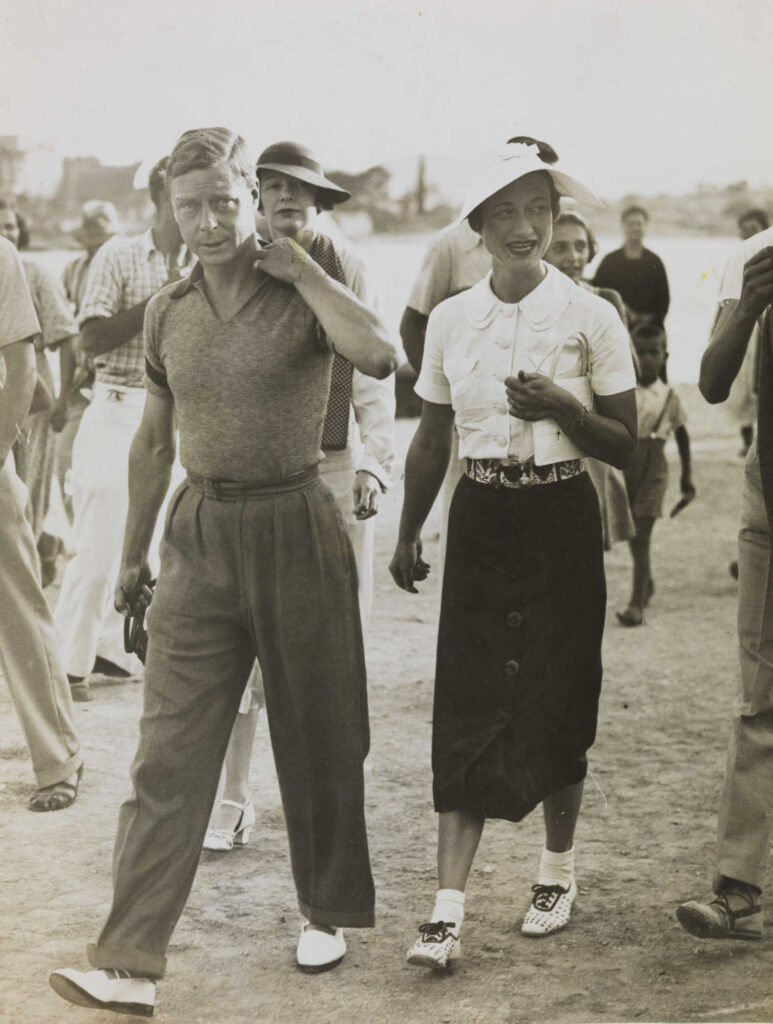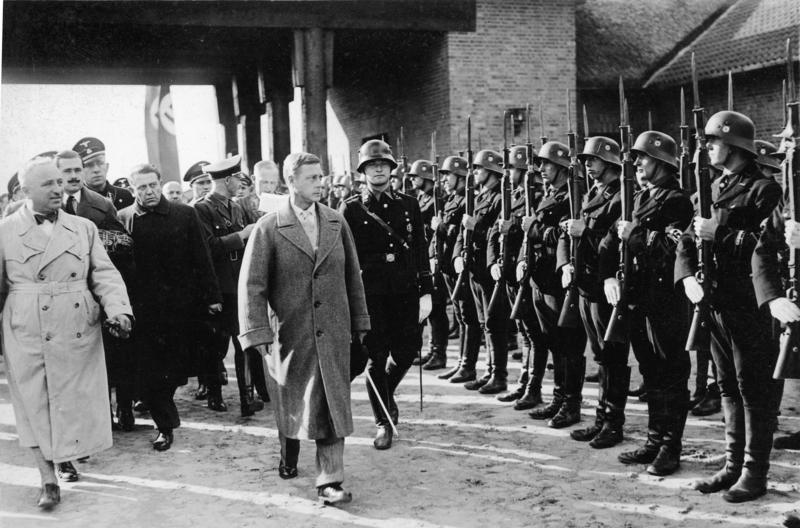
King Edward VIII and Mrs Simpson on holiday in Yugoslavia, 1936, credit Wikipedia
Traitor King,
Andrew Lownie,
Blink Publishing Bonnier books, 2021,
isbn 978-1-78870-487-8, reviewed by Monty Skew
Before his death in 1972, Edward, Duke of Windsor, mindful of history and his inglorious role therein, gave an interview in which he boasted of his ‘love for Britain’ and how he wished it well. This interview was welcomed by diehard fans of the Duke and of his wife, Wallis Simpson. Any remaining fans should reconsider their views after reading this book.
Prior to the Norman conquest there was in some parts of England an Anglo-Saxon system for choosing or replacing a king known as Witemagot. The Accession Council is the nearest equivalent. Under Witemagot, Edward would not have been chosen as king and indeed might have been removed. Much has been written about the prevalence and dangers of royal inbreeding. All dynasties have methods of ridding themselves of an obvious encumbrance. Sultan Ibrahim, the mad Ottoman sultan, was a Canute-like figure. He ordered hot coal to be shovelled into the sea to keep it warm. He was removed by a plot involving his generals and bureaucrats. His own mother consented to his execution by strangulation. They could not countenance a monarch who was deranged while the country was at war.
Edward ascended the throne in 1936 on the death of his father George V, a strict disciplinarian, evidently exasperated by his weak son. He wanted his younger son George to succeed him (which he did eventually). Edward did not last long. He formed a liaison with twice divorced Wallis Simpson while head of the church. This was not acceptable to public opinion which turned against him. King Edward abdicated because he was forced to. He may even have been blackmailed into it because of youthful indiscretions. He was kept under constant surveillance as he could not be trusted. Wallis herself had a colourful and chequered past. It was not only that she was divorced. In her laughable hagiography of Simpson, Diana Mosley (wife of Oswald) suggests that Simpson added to her income by her ‘winnings at poker’ in Shanghai. There are many unsavoury activities associated with casinos. Let’s just say she swallowed more than her pride during her Shanghai days. Although the British press kept quiet, Windsor and Wallis were featured in the continental tabloid press. It was in fact concerned Britons abroad sending cuttings to No 10 which activated the proceedings.
The scheming adventuress Wallis desperately wanted to be Queen Consort but the abdication shattered her dreams. She never forgave Edward and the rest of their lives were spent pretending to have had a great love affair. Lownie takes up the story post-abdication. The control that she exerted over Windsor continued. There is absolutely no doubt about Windsor’s sympathies. He did not feel British. He even boasted about his lack of British blood. He spoke fluent German and once proclaimed “I am German”. Like many unconfident and sexually repressed men, he had fascist/Nazi sympathies. The sham of his ‘love of the century’ was slow to be exposed as so many journalists and publicists etc invested in the myth. Their livelihood depended on continually re-cycling this fictional love story. The Windsors, tied together and dependent on each other, were tabloid fodder.
Churchill was a strong supporter of Windsor during the abdication crisis. Like Windsor, he had extravagant tastes and many of his bills were settled by supporters. But at least Churchill did not mix with undesirable elements in casinos and nightclubs. Edward was a well-trained sponger who lived off those who wanted to rub shoulders with royalty. Both Windsor and Simpson, though rich, were grasping and exploitative. He has been accused of shady dealings and of defrauding insurance companies after the theft of her jewellery which later turned up in their possession. There are parallels here with former king of Spain, Juan Carlos, who stood down under a cloud of allegations of money-grabbing. Wallis Simpson sometimes sent for her own chef to cook at a meal to which she had been invited. Her love of luxury, at a time when Britain was at war and suffering privations, was unseemly. So was her constant craving for attention. She wanted to be addressed as HRH with continual curtsying. Royalty deserves respect but not obsequiousness.
Certain archives remain locked. Some have been embargoed for the next 80 years. Robert Vickers in his hagiography discusses this but avoids the contentious issue of whether Windsor was a traitor. His appointment as ‘Governor of Bahamas’ in 1940 ensured that he could be kept under observation by the secret service. Churchill, now PM, gave Windsor a coded warning of a possible court-martial for refusing to obey military orders. The evidence of his treason is over-whelming and any jury would have found him guilty. There is more than circumstantial evidence that he either deliberately informed the Germans of certain secret plans or was indiscreet about them. His version was ‘seeking peace’. Simpson was also close to German connected sources and some of her staff may have been placed by the Germans.
In the event of a German occupation, Edward would have regained his throne and served as figurehead Quisling. Much of this is detailed by Sybil Oldfield in The Black Book, the Gestapo’s well-developed plan for utilising members of the elite in occupied Britain. There is no doubt that Edward was a traitor. This book proves it. Baldwin was a divisive figure but in getting rid of Windsor he was perhaps the last PM, outside of wartime, to put country before party.
Future historians will doubtless refer to Traitor King, which includes interviews and private correspondence. Readers will find the bibliography useful, including the list of the trashy novels written about Windsor. Meticulously annotated throughout, this book may well become the definitive account of Edward, Duke of Windsor, after his abdication.

Der Herzog von Windsor auf der Ordensburg Crössinsee in Pommern am 13.10.37. Der Herzog schreitet die Front der SS im Burghof ab.











Seeking peaceful co-existence is not the same as welcoming surrender.
Some of this “circumstantial” stuff is not at all new, but a collection of dubious stories, with added spice to which the subjects have no opportunity to reply.
It is quite true that young Edward spoke fluent German even in the royal household, an gratuitous international asset however rather than proof of treason years later.
It was the politicians who neglected our island defences and then gave an impossible blank queue to Poland, invaded by the Nazis and Soviets, thereby risking defeat, surrender and collaboration in the event of invasion, since not everyone would join Churchill in “choking” in his “own blood” (or alcohol). Anyway his “empire” scarcely lasted a thousand 1000 weeks, let alone years, after the heroic sacrifice of our airmen, sailors and soldiers, and a murderous communist empire was established from Trieste to Tonkin.
As for traitors, how about the communists who initially aided the German war effort, the unpunished Melita Norwood, or Harold Wilson known to his Soviet handlers by the codename Olding?
For another view, see Peter Hitchens’ “Phoney Victory” (2018).
Edward has been “accused” of describing Hitler as a “serious and vigorous” politician. Well, he was, wasn’t he? The ex-King could hardly have been unimpressed by the German response to unemployment, inflation, urban slums and rampant crime, but for eulogies of Adolf BEFORE he killed lots of people you could quote Lloyd George and early on even Winston Churchill, not to mention political eulogies of Stalin, Mao and Castro AFTER they killed lots of people.